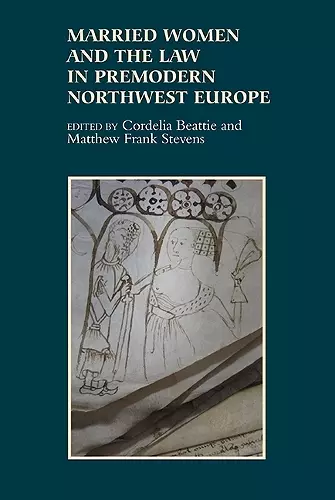Married Women and the Law in Premodern Northwest Europe
Cordelia Beattie editor Matthew Frank Stevens editor
Format:Hardback
Publisher:Boydell & Brewer Ltd
Published:18th Jul '13
Currently unavailable, and unfortunately no date known when it will be back

Fresh approaches to how premodern women were viewed in legal terms, demonstrating how this varied from country to country and across the centuries. There has been a tendency in scholarship on premodern women and the law to see married women as hidden from view, obscured by their husbands in legal records. This volume provides a corrective view, arguing that the extent to which the legal principle of coverture applied has been over-emphasized. In particular, it points up differences between the English common law position, which gave husbands guardianship over their wives and their wives' property, and the position elsewhere in northwest Europe, where wives' property became part of a community of property. Detailed studies of legal material from medieval and early modern England, Wales, Scotland, Ireland, Ghent, Sweden,Norway and Germany enable a better sense of how, when, and where the legal principle of coverture was applied and what effect this had on the lives of married women. Key threads running through the book are married women'srights regarding the possession of moveable and immovable property, marital property at the dissolution of marriage, married women's capacity to act as agents of their husbands and households in transacting business, and married women's interactions with the courts. Cordelia Beattie is Senior Lecturer in Medieval History at the University of Edinburgh; Matthew Frank Stevens is Lecturer in Medieval History at Swansea University Contributors: Lars Ivar Hansen, Shennan Hutton, Lizabeth Johnson, Gillian Kenny, Mia Korpiola, Miriam Muller, S.C. Ogilvie, Alexandra Shepard, Cathryn Spence.
An important starting point for anyone who wants to understand regional variation, chronological change, and the relation between learned law and pragmatic legal processes relating to women and their economic roles. * THE MEDIEVAL REVIEW *
A nuanced, engaging volume, well worth the attention of economic, social, and gender historians alike. * . *
This excellent collection is important reading for any student interested in the intersections of legal identity, marital status, and economic power. * MEDIEVAL FEMINIST FORUM *
This collection makes an outstanding contribution to the field. * WOMEN'S HISTORY REVIEW *
ISBN: 9781843838333
Dimensions: unknown
Weight: 478g
260 pages